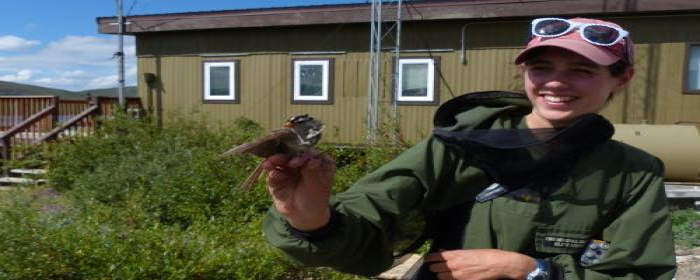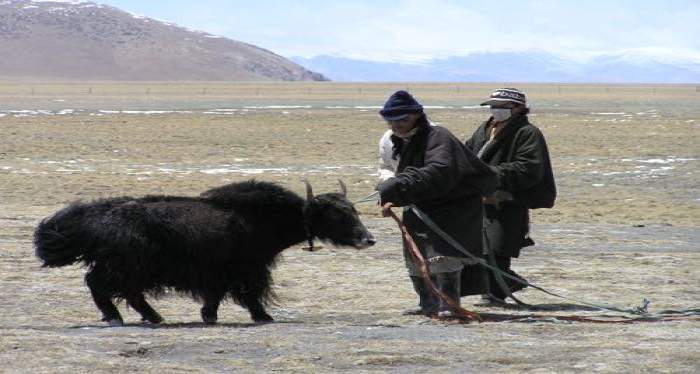Team Squirrel is the name of the group I'm working with on this expedition, and most of the time it will just be me and Cory Williams, the principal investigator, in the field. But we're lucky to have been joined for the first week by Helen, who is currently in the process of finishing her PhD at UC Davis. Her work currently focuses on White-crowned sparrows and Lapland longspurs that breed in the Toolik area in the summer, and how they time reproduction and migration. Once she graduates, she'll be working in Cory's lab as his post-doc. She came up to Toolik to get a feel for working with the squirrels, which will be her new study animal.
Helen left today to drive back to Fairbanks, and I really enjoyed working with her and learned a lot from her, including how not to be afraid of the sauna. I wanted you to know a little more about her, so I asked her to give us an introduction to her and her work.
 Helen Chmura with a White-crowned sparrow.
Helen Chmura with a White-crowned sparrow.
"I'm a field biologist at heart and I'm especially interested in how animals prepare physiologically for seasons, and what the consequences are when they don't get ready at the right time. Though I'm doing my PhD on migratory songbirds, over the years I've also studied diamondback terrapins, yellow-bellied marmots, and plants, and volunteered on projects studying fish and wolverines.
One of the funniest things I've ever done for science is serve as a 'yak babysitter.' The research project I was working with was looking at the effects of yak grazing and experimental warming on vegetation on the Tibetan plateau. Local villagers would bring yaks to the field site in the morning and I had to watch them and make sure that they didn't get loose and run all over the wrong experimental plots.
 Yaks on the Tibetan plateau.
Yaks on the Tibetan plateau.
As for my life outside of science, I play flute in local orchestras, love to bake pies (my favorite is strawberry rhubarb), and am an avid hiker. I love dogs and when I defend my dissertation and finish my degree my present to myself will be to adopt a dog."
I want to thanks Helen for telling us a bit about herself, and for giving us a look into the variety of places field research can take you. It sounds like she's had a lot of great adventures, and that she's got a lot more in store. It's also nice to see that scientists still have time for other fun stuff as well.


Add new comment